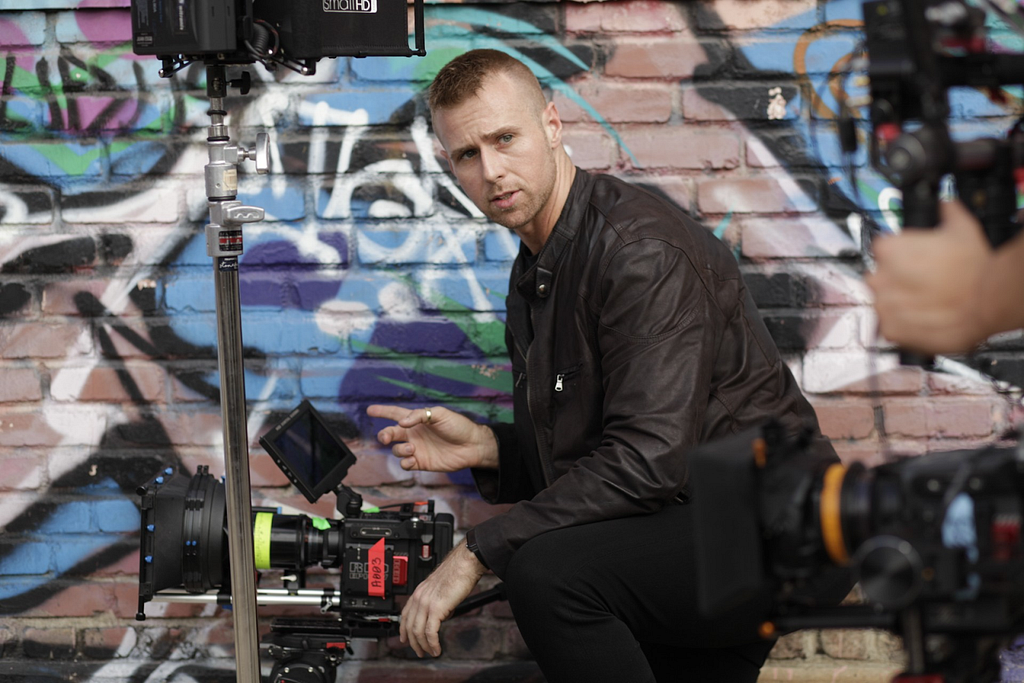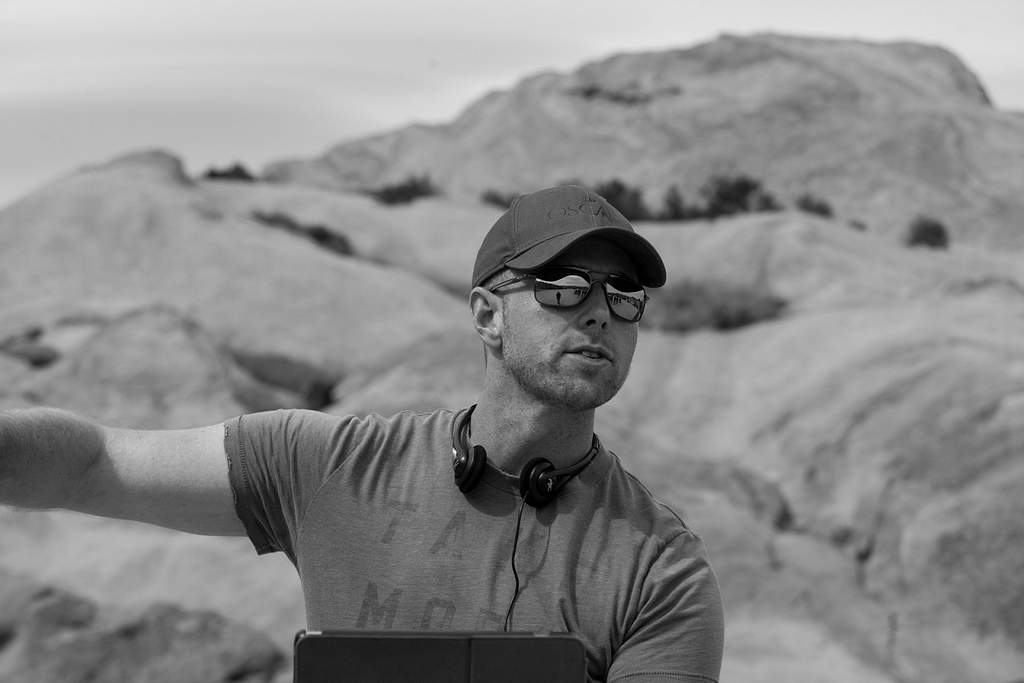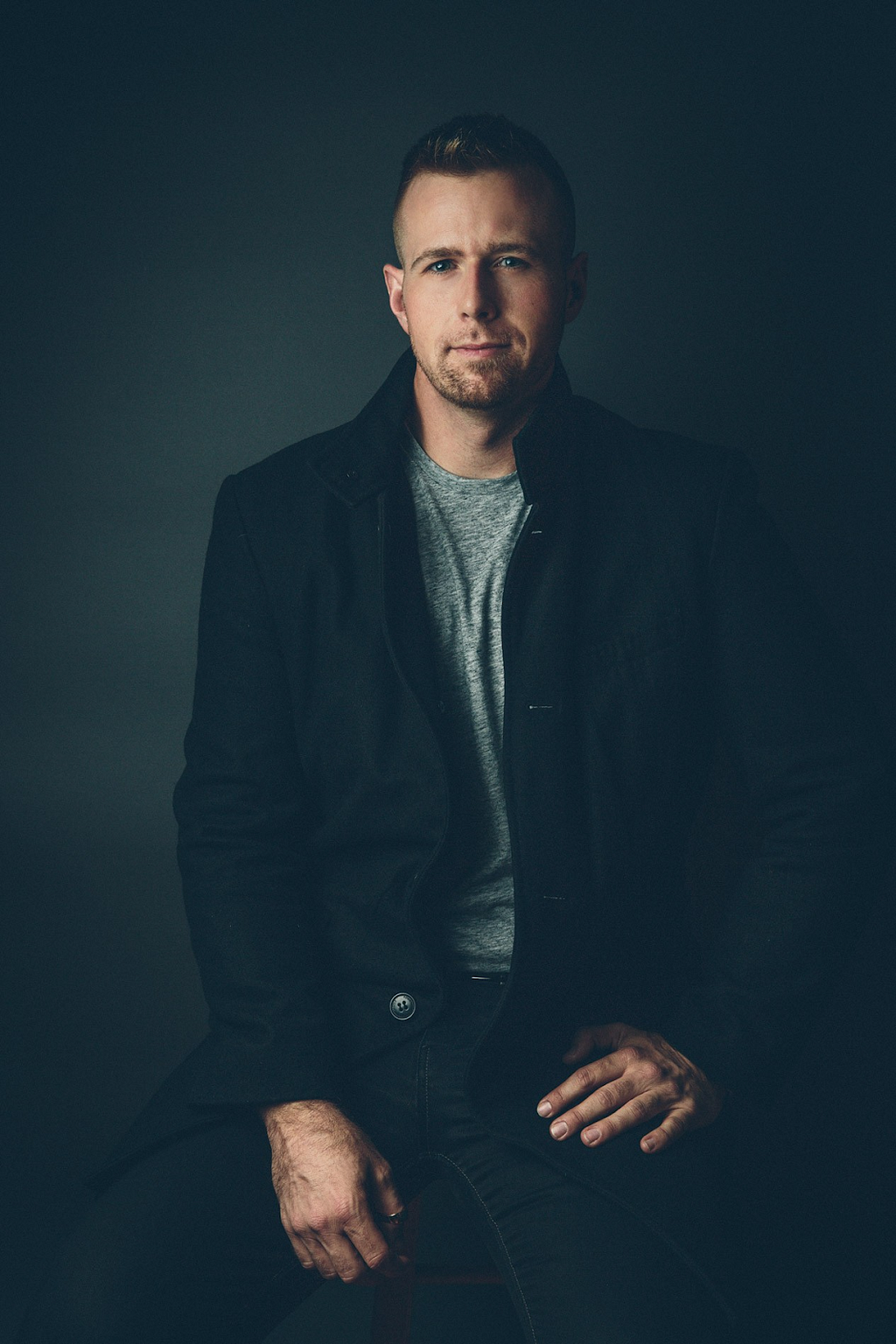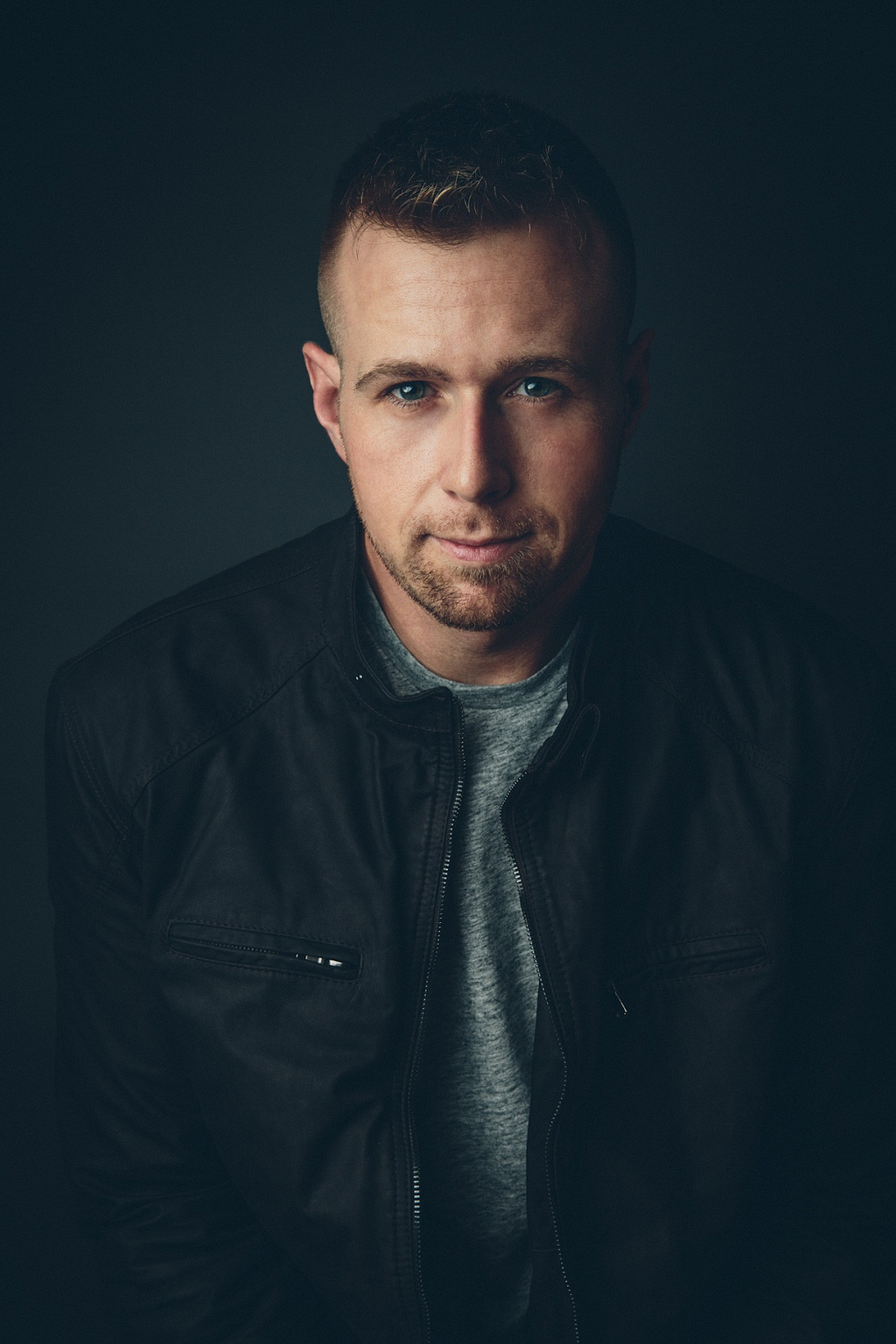Christopher Folkens Of ‘Catalyst’ On Five Things You Need To Create A Highly Successful Career In TV & Film

…Gratitude. I am so grateful to everyone who has worked with me and provided opportunities along the way. No one likes working with a jerk. The more we express gratitude for the people we work with and the opportunities we’re given, the better. When I work with crews who pour their heart into their craft and elevate what they do, it adds a kind of magic to the process. It’s beautiful to witness. I’m so grateful to all the people who put their love into their work because it makes what I do that much more special…
I had the pleasure of talking with Christopher Folkens. Christopher is a filmmaker, director, and creative entrepreneur whose work spans feature films, television, and content marketing. With a career defined by a commitment to storytelling, Folkens has established himself as a director with a keen ability to craft emotionally resonant narratives that engage audiences across various mediums.
Born and raised in Chicago, Folkens initially considered a career in law before shifting his focus to filmmaking during his time at the University of Illinois. With no formal film program available, he created his own curriculum, blending independent studies with coursework in leadership, advertising, and speech communication. This self-directed approach allowed him to develop a broad skill set that would later inform his work as a director, writer, and editor.
After graduating, Folkens entered the advertising industry, working with the renowned agency Leo Burnett in Chicago. His experience producing commercials provided him with hands-on training in large-scale production and the business side of filmmaking. Seeking greater opportunities in narrative storytelling, he relocated to Los Angeles in 2011, where he began directing music videos and corporate content while honing his skills in narrative filmmaking.
One of his early successes came with Diversion (2010), a short film that won multiple festival awards and helped establish his reputation as a director. His work in promotional content for major networks, including Disney and ABC, further expanded his industry reach. He played a role in shaping promotional campaigns for high-profile events such as the Oscars and New Year’s Rockin’ Eve with Ryan Seacrest, as well as television shows within the Shonda Rhimes-produced Thank God It’s Thursday (TGIT) lineup. His work directing promotional content for How to Get Away with Murder provided him the opportunity to collaborate with Academy Award-winning actress Viola Davis.
Folkens gained further recognition as the series director of RZR, a science fiction project created by David Bianchi. The show received a Primetime Emmy nomination, a significant milestone for an independent production competing against major studio-backed projects. Actress Mena Suvari’s performance in the series earned her an Emmy nomination, further elevating the show’s profile.
His most ambitious project to date is Catalyst, a feature film nine years in the making. The psychological thriller, set for release on February 11, 2025, is described by Folkens as a social experiment disguised as a contained thriller. Inspired in part by 12 Angry Men, the film uses structured improvisation to heighten the realism of its performances. According to Folkens, Catalyst is designed to provoke conversation and challenge audiences to examine societal divisions through a tense, puzzle-like narrative.
Beyond his work as a filmmaker, Folkens has taken an active role in mentoring aspiring directors. His online course, Directing Your Debut, provides emerging filmmakers with practical guidance on overcoming creative and professional obstacles. Drawing from his own experiences navigating the industry without traditional pathways, he emphasizes resilience, introspection, and gratitude as key components of a sustainable creative career.
Folkens remains engaged in multiple aspects of the entertainment industry, balancing commercial work with independent filmmaking. His career reflects a dedication to both artistic integrity and professional adaptability, positioning him as a filmmaker with a growing influence in both the narrative and promotional spheres. As he continues to expand his body of work, his focus remains on telling stories that not only entertain but also provoke thought and reflection.
Yitzi: Chris, it’s a delight and an honor to meet you. Before we dive in, our readers would love to learn about your personal origin story. Can you share a bit about your childhood and how you grew up?
Chris: Oh, wow. Okay. Well, I grew up in Chicago — born and raised. I was originally planning to go into law, ironically. I took one law class my freshman year of college and quickly realized I had fallen in love with the Hollywood version of law, not the real thing. Thankfully, I figured that out early on and decided to pivot.
So, I spent my time in college focusing on creating films. There was no film program at the University of Illinois, where I went, but there was a film club. I basically created my own film program within the university. At the same time, I had been a musician for a long time, and I loved Hans Zimmer’s music. I thought, “Maybe I could write music for movies.” That idea led me to consider a career in film, using my music background as an entry point.
At first, I figured I could compose music for some of the student films, but all the films being made in the club were comedies, and I wanted to create something more in line with Hans Zimmer’s world. So I thought, “I’ll just make my own films.” What started as a way to compose music for my own projects quickly led me to discover my love for directing. I had always loved acting in high school, so directing felt like the perfect fusion of all my creative interests.
It was an incredible realization. Directing allowed me to coach and shape performances while also overseeing the music — though I didn’t have to be the one composing it. I came to see the director as the conductor of an orchestra, guiding all these creative elements into a unified vision. That realization really sparked something in me.
Since there was no formal film program, I built my own. I created independent studies, combined leadership and advertising courses, and used my speech communication major to craft a unique hybrid curriculum. Where there was no path, I made one. That approach allowed me to learn a wide range of skills.
After college, I started working in advertising, producing commercials with Leo Burnett in Chicago. It was like getting paid to go to film school — I learned how to work with vendors, understand production at larger scales, and navigate the business side of filmmaking. After a few years, I hit the ceiling of what I could do in Chicago and moved to Los Angeles in 2011.
In LA, I started with music videos and corporate videos to establish a foundation. I also took a directing class with Judith Weston, a well-known author and directing coach. She wrote Directing Actors and The Director’s Intuition and has trained some of the best, like Joseph Kosinski, who directed Top Gun: Maverick. Through her class, I was exposed to a short film night where I screened my film Diversion. It was well received and won several film festival awards.
That screening led to a major opportunity. My film played alongside another short that I had seen on the festival circuit. The filmmaker behind that project, Brenda, turned out to be a senior producer at ABC Television in marketing. After the screening, we talked, and she recognized my film from the Cleveland Film Festival. She told me, “Give me a call if you want to make some real money.”
So, I sent her a trailer I had cut for my short film, and she passed my reel around at ABC. That opened the door for me to start working in the promo world. For the past decade, I’ve been working with Disney and ABC, creating promotional content for their shows, including the Oscars, New Year’s Rockin’ Eve with Ryan Seacrest, and many others. I’ve also done some work with Hulu.
At the same time, I’ve always continued making my own films. My projects have gone on to win festival awards, and now, with the release of my feature film Catalyst, it feels like an exciting next step. It just goes to show — there’s no single path into the film business. I created my own because I loved my school and didn’t want to leave. I just found a way to make it work, and that mindset has stayed with me ever since.

Yitzi: It’s amazing. You probably have some incredible stories from the different chapters of your journey. Can you share one or two stories from your professional life that stand out most in your mind?
Chris: One or two stories from my professional life? Well, the first night of shooting on Catalyst, the feature we’re releasing on Tuesday, the 11th, definitely stands out. This film has been nine years in the making — from concept to distribution, nine years. That first night of filming was truly unique.
I don’t know how much you know about it, but I’ll give you a little background. I knew from the start this was going to be a completely unconventional way to make a movie. That first night of shooting was an overnight shoot with three cameras, 12 microphones, and we were capturing the events of the night almost like a live event. It was a completely non-traditional approach, using structured improvisation with a core ensemble of seven actors who were reacting in real time to situations I was creating in the moment.
It was essentially a social experiment. A couple of years before that, we had attempted an earlier version, but it had too many actors and wasn’t quite working. The concept was inspired by 12 Angry Men, but reimagined as a contained thriller. Actually, to backtrack a little, I was in a high school production of 12 Angry Men, and that experience stuck with me. It made me realize that a movie or a play could not only reflect the world as it is but also show what it could be. That idea stayed with me, and in many ways, it was the foundation for Catalyst. I wanted to create a modern-day version of that kind of story — one that reflected the social issues of our time but within the framework of a tense, contained thriller.
That first night of filming was unlike anything I’d ever done as a director. Normally, I love having my shot lists, my storyboards, all the preparation a director relies on to feel ready for a shoot. I like having a plan. But this production forced me out of that mindset. It deliberately challenged me to become a better filmmaker by trusting my instincts, my team, and the story itself. Everything I knew about filmmaking was turned on its head.
That night was pivotal because we used it to reverse-engineer the rest of the film. The social experiment at the heart of Catalyst was designed to create real conflict between the characters, mirroring what was happening in the world at the time. In a way, you can see the connection between 12 Angry Men and Catalyst — both explore social tensions through a confined, pressure-cooker scenario. 12 Angry Men was about a jury room drama that exposed racism and bias. Catalyst takes on modern hot-button issues — topics that were relevant nine years ago when we started, but are even more urgent, intense, and sometimes violent today. If we don’t address these patterns as a society, they’ll just keep repeating.
I’m going off on a bit of a tangent, but that first night was profound. It was unlike anything I’ve ever done. So that’s one big one.
I think that’s the one that stands out the most for me, honestly.
I will say, I loved working with Viola Davis. I got to direct her a couple of times for promo work related to How to Get Away with Murder, and working with her was an absolute delight. One particular night stands out — it was a promo shoot with the entire Shonda Rhimes family at the time. I had the chance to work with Shonda Rhimes, Kerry Washington, Ellen Pompeo, and Viola Davis as we welcomed Viola to the Thank God It’s Thursday (TGIT) lineup. It was surreal having all of them in the same room. Even though it was just a promo, it felt like being in a room full of royalty.
I’ve been fortunate to work with so many incredible people over the years. Another moment that stands out — though it wasn’t a specific day on set — was directing Razor, a series created by David Bianchi. David is also one of the actors in Catalyst, as well as a story writer and producer on the film, so we go way back. Directing on Razor was an amazing experience, and then last year, the series was nominated for an Emmy, which was pretty profound. As far as I know, we were the only independent project among all the big studio productions nominated for a Primetime Emmy. That was incredible.
Another highlight from Razor was directing Mena Suvari. Her performance ended up earning her an Emmy nomination, which was so exciting to see. She came in completely prepared, ready to do whatever was needed, which was especially impressive considering how fast we had to move on that production.
I’m not sure if that fully answers your question, but those moments definitely stand out as some really special experiences to be part of.

Yitzi: So, Chris, you have such an impressive body of work. Please tell us more about Catalyst. Why do we have to watch it? As consumers, we have so many choices — why should this be at the top of our queue?
Chris: I would say it’s unlike any other movie you’re going to see, both because of how we shot it and how it reflects not just the world we live in, but the world we could live in. The movie is very much a psychological thriller, a mystery, and an allegory for the idea that when we dehumanize each other, we all lose.
When it comes to the world we live in today, if there’s one thing we need to really examine — well, I don’t want to say need because that sounds preachy — but the question is, what would the world look like if we actually allowed that idea to work within us?
This movie has been a nine-year journey. It’s truly a passion project from the start. We never gave up. We faced so many challenges — well, I don’t want to make it all about us — but this is the indie film spirit to the nth degree. We didn’t have studio backing. The film was largely self-financed, with support from independent financiers who were passionate about making sure it got to the screen exactly as intended. It wasn’t about shaping it to fit studio standards, but about keeping its pure vision intact.
Does that make sense? We didn’t want it to turn into something like Saw, where everyone’s just out to kill each other. In fact, an easy way to describe Catalyst is that it’s like an inverted version of Saw. In those movies, the characters have to kill each other, even if they don’t want to. But in Catalyst, they want to kill each other — but they can’t, because if they do, the consequences are even more personal. So we took that kind of premise and flipped it on its head, forcing us to examine who we are as human beings, as fellow citizens.
I love the idea of a movie being like a puzzle, where the viewer is actively unraveling the story, almost like a choose-your-own-adventure experience. I’ve always been a fan of movies that challenge the audience — Christopher Nolan’s films, for example. Catalyst is a mind-bending film, designed to make you think, to make you question, and to serve as a dramatic mirror for how we live our own lives.
At the end of the day, I want people to walk away truly moved. This film is designed to push buttons, to spark the kind of uncomfortable conversations that the world is both craving and resisting. Does that make sense?

Yitzi: So this is our signature question. You’ve been blessed with a lot of success. Can you share five things you need to create a successful career as a filmmaker, based on your experience?
Chris:
- Okay. I think vision is number one — what kind of filmmaker do you want to be? What stories matter to you?
- I think resilience is tied for first. I’m not necessarily going to rank these, but vision and resilience are definitely at the top. The ability to get back up is crucial because this business is full of rejection and setbacks. You have to be able to keep going.
- Tied to that is commitment — being willing to do whatever it takes. For example, this film took nine years from concept to distribution. That required an incredible amount of commitment, resilience, and vision.
- For the last two, I’d say introspection is really important — the willingness to look within. We are often our own worst enemies. When I first moved here, getting things off the ground was tough. But what I didn’t realize at the time was that I was in my own way. I did a lot of personal development work, emotional intelligence work, and really examined where I was holding myself back. That’s actually something I focus on in my online course, Directing Your Debut, where I work with young filmmakers just starting out. I help them get out of their own way so they can create their own films. It’s the kind of guidance I wish I had when I was starting out. So having a mindset for growth and introspection is key.
- And the fifth one? Gratitude. I am so grateful to everyone who has worked with me and provided opportunities along the way. No one likes working with a jerk. The more we express gratitude for the people we work with and the opportunities we’re given, the better. When I work with crews who pour their heart into their craft and elevate what they do, it adds a kind of magic to the process. It’s beautiful to witness. I’m so grateful to all the people who put their love into their work because it makes what I do that much more special.

Yitzi: This is our final aspirational question. Chris, because of your great work and the platform that you’ve built, you’re a person of enormous influence. If you could spread an idea or inspire a movement that would bring the most good to the most people, what would that be?
Chris: If I could inspire a movement, I would say it goes along with what I mentioned earlier — when we dehumanize each other, we all lose. But instead of focusing on noticing dehumanization, the question is: how do we humanize each other? It would be something like the “Humanize Movement,” where we make an active effort to see the masterpiece in another person, especially when our initial reaction is judgment.
Just imagine what the world would look like if we truly humanized each other, instead of continuing down this path of division. So yeah, let’s call it the #HumanizeMovement.
Yitzi: Beautiful. How can our readers watch Catalyst?
Chris: It’ll be available on video on demand on Tuesday, February 11th — literally next Tuesday. It should be on Amazon for purchase or rental, along with other similar platforms. I’m not exactly sure of all the platforms, but it’ll be on video on demand starting February 11th. I’m very excited to get it out there.
Yitzi: Amazing. I’m excited for you, Chris. It’s an honor to meet you.
Chris: Great to meet you too. Thank you so much — I really appreciate it.
Christopher Folkens Of ‘Catalyst’ On Five Things You Need To Create A Highly Successful Career In… was originally published in Authority Magazine on Medium, where people are continuing the conversation by highlighting and responding to this story.